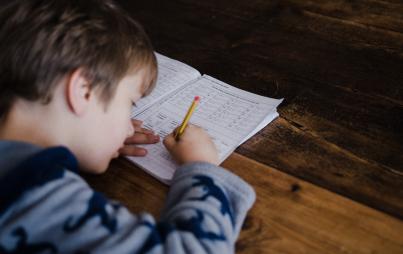
I can foster confidence in hands-on parenting. I'm teaching my child what I never learned.
My husband Kerry lines up the carrots. Chop chop chop. He lines up the potatoes. Dice dice dice. He’s making a stew in our tiny kitchen, while our five-year-old daughter sits cross-legged on the counter, watching him.
“Now I’m going to add a splash of olive oil,” he says, and when she asks if she can do it, he obliges. He hands her the glass bottle, and she tips it toward the stove. The cast iron stew pot is already piping hot; her knees are less than a foot away from its surface. Kerry’s body is coiled for action, but he watches our daughter calmly. She loses her balance and pours half the bottle into the pot.
“Olive oil is good for the heart!” Kerry says, smiling.
I stand at the threshold of our kitchen, watching this tableau as though it were playing out on a stage rather than in my own home —and as though I had balcony seats, far from the action. It is hard to believe my own proximity to such domestic serenity and good cheer.
If I am afraid of my limitations, I overcome that fear in private. I know too well from my own mother how contagious are self-belittlement and self-defeat.
I did not grow up sitting on kitchen counters, surrounded by chopped vegetables and bags of flour and measuring cups. I did not grow up watching a parent cook — my mother was such a bundle of nerves when it came to domestic tasks that I was always shooed out of the way so that she could concentrate. Indeed, she self-medicated for her attention problems. It was not until adulthood that I realized this was not normal — a mother who took a handful of pills before making dinner or cleaning the house. If my mother was anxious and lacked focus, my father craved efficiency and solitude. “Out of my way!” he’d yell despotically, while at work in the kitchen.
I remember my early childhood as a series of islands with populations of one family member each: my mother ran errands while I stayed home under the loose supervision of a housekeeper, my father sat in his small study for hours, listening to Mozart, reading, and drinking orange juice spiked with vodka, my older sister had older sister things to do in her room. We lived in a large house off Mulholland Boulevard, with land all around and coyotes lurking in the bushes. We had a swimming pool, lots of light, and many other luxuries: dance lessons and private schools.
What we did not have was a family.
When I met my future husband, I thought: I’d better learn how to do all the things he knows how to do. I’d better not let him find out how incompetent I am. How does he know how to do so many things with such confidence? When he wants to bake a cake, he piles the ingredients on the counter and barely consults the recipe. Spilled flour and mounting dishes do not overwhelm him. He tackles household paperwork and bill-paying with annoyance, but not fear. When we needed bookshelves to fit our living room, he hung them himself. Setting up sconces and creating a swagged chandelier? All in a day’s adventures with my excessively competent husband.
When Kerry and I moved in together, I wanted to throw a cocktail party. The real, grown-up kind with mixed drinks. Kerry googled recipes; he bought a book. He became a master not only of the St. Germain and the Mudslide but of the banter required to host a smoothly run affair.
You Might Also Like: Choosing Yourself: Why I Severed Ties With My Mother
Now that he has a child, it is natural for Kerry to pass on through example his ease with daily tasks, both domestic and worldly. Starting when she was two, Kerry would take our daughter on laundry runs to the basement, where she was in charge of cleaning out the lint trap and shaking the clothes before they went in the dryer. When he makes a smoothie, my daughter is in charge of adding the yogurt, the milk, the blueberries. When he sits at his desk, building a website with code, she sits with him as he explains what it all means.
Kerry is also a screenwriter and is quick to notice when our child is using the principles of story-structure in her dinner table anecdotes. He applauds her punchlines and points out why her story worked so well. When our child grows frustrated over math homework, Kerry inhabits a favorite doll, who stumbles and learns the problems first — with this technique he coaxes our daughter to find her own way through harrowing word problems.
What’s really at work here? He is demystifying the world for her.
And after watching this pas de deux for five years, I believe this act to be among the most crucial things a parent can do for a child.
I worked as an actress in television from the time I was eleven. I danced in pointe shoes from the time I was nine. I learned the lessons of divorce by the age of ten, and out of necessity, I learned how to pack a bag with speed and efficiency — I was transferred from my mother’s house to my father’s apartment and back — several times a week. But I can’t think of a single domestic task or basic life skill my parents had taught me by the age of eighteen when I headed to New York City for college. I have only now begun to unpack the strangeness of my domestic beginnings, by witnessing my husband’s demonstrative tendencies, his spirit of inclusion, and his essential optimism.
“I can’t sew! I can’t bake! I don’t do domesticity!” These were my mother’s frequent refrains. With an iron will I have set about sewing birthday crowns for my daughter every year. She likes to sit with me while I work and fondle the small silk flowers and faux pearl buttons that will embellish the flannel each year. I like to make sure the stereo is set to the loveliest, brassiest jazz when she and my husband come back from the playground so that when she enters our apartment, she feels that the flow of life is joyful and smooth in her home. And if she wants to cook with me, then she pours in the coconut oil and sprinkles the cinnamon before I roast the sweet potatoes. If I am afraid of my limitations, I overcome that fear in private. I know too well from my own mother how contagious are self-belittlement and self-defeat.
I was not born into confidence or easy homemaking the way my husband was. But by learning from him what confident parenting looks like, and further, from deriving mighty pleasure in seeing how successful is his gentle, daily teaching, I can foster confidence in hands-on, messy parenting.
At times, I suffer. Under the surface, my hands shake when I sew; I lament the rough, obvious stitches on the flannel I have purchased for the yearly crown. Under the surface, I doubt my every move as a mother. I try to learn confidence from my husband, but I recognize that learning from him as a wife is not the same easy process that it must be to learn from him as his child. To be born into healthy interactions, to feel the ground solidly under your feet from youth, to be able to tell your friends in the first grade that you know how to scramble an egg — these are the precious gifts my daughter has received from her dad. I can look on, and learn, and enjoy, but to some extent, my nose will always be pressed against the glass.
I will never enter the inner sanctum of confidence that the two other members of my family occupy.
My daughter looks a bit like me as a child — she has the same silky curls and pigtails, the same tip of the chin and lightness of voice. I cannot help at times feel that I am watching myself be re-raised on that kitchen counter, as the morning light fills our kitchen. I sneak in while they work and I pour my coffee, heat it up in the microwave, and retreat to my room. It’s like a radio show playing out beyond the bedroom door, just past those kitchen shutters. And it is such a delightful radio show, so filled with sweetness and mutual respect.
Over time, my daughter will learn more. She’ll learn how to fold a shirt, how to clean a kitchen, how to pack a bag, how to make dinner from whatever is in the fridge, and which cooking oil has the highest smoke point. I have specific things, as well, that I want to teach my child: how to tell a good story, how to sharpen a pencil for sketching, how to write a heartfelt letter (on paper) to a friend in need, how to preserve books, how to frame photos, and how to find the meter in any song. My list grows with the months and years.
I may never sew with confidence nor cook with ease while a small child drops grated cheese all over the floor. I was not born into confidence or easy homemaking the way my husband was. But by learning from him what confident parenting looks like, and further, from deriving mighty pleasure in seeing how successful is his gentle, daily teaching, I can foster confidence in hands-on, messy parenting. They say we seek to correct that which went wrong in our own childhoods when we parent our children; I would not have known how to do this had my husband not set such a fine example right here in my own home.








